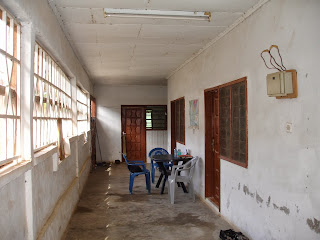Zebilla is remote.
Very remote.
Zebilla is hot. Very
hot.
At present it is the rainy season so we are surrounded by
lush green vegetation. Millett and maize
are planted hap hazardly wherever there is a spare patch of soil. Rice grows in the wetter lowlands. There are some beautiful, tiny yellow
butterflies flitting around in abundance; frogs croak; a rather loud local
pigeon begs to be noticed. Lizards of
all shapes and sizes abound. I didn’t
realize how noisy they are!
We are told that come the dry season all of this fertile
land will become arid and brown and I can believe it, having experienced the
heat.
A variety of livestock roams around freely: goats, pigs,
chickens, guinea fowl. If you are not
woken up by a helpful cockerel each morning then the call to prayer emanating
shortly afterwards is sure to get you!
Zebilla is a town of some 23,000 ( I found this figure
somewhere but it seems rather large).
The main road cutting through the town is a busy thoroughfare filled
with bikes, motor bikes, tro tros (the local bus, like a minibus), buses and
lorries. It is alive with kiosks, huts
and traders making and selling their wares from early morning until dusk. On market days there is a cacophony of
chatter; greetings, trading, bargaining, all of which is a bit overwhelming for
the “nasara” (white man). Couple this with the fact that we have no idea what
many of the products on sale are – strange powders, dried fish, nut like fruits,
oddly shaped vegetables – and it becomes an endless game of “name that object”!
Moving further back from the main road are the channels of
dirt tracks leading to the living areas.
These can vary from the traditional courtyard farm houses built around a
shady tree using mud bricks and a local render with thatching and corrugated
iron roofs, to something more like ours, the “white” house.
Our house is basic but adequate. Well, apart from the mosquito
prevention! We spent a large part of the
weekend stuffing old plastic bags and fabric into the holes in the doors, walls
and netting. They still get in!
Zebilla is incredibly friendly. Large proportions of time are spent in
greetings. These are filled with genuine
warmth and are a reminder to all that life is precious and it is a joy to be
alive each new day. If you need
something you only have to ask and help will be forthcoming.






You may be able to set your camera to take some lower resolution photos which would take far less time to upload which may make using a slow unreliable link more possible.
ReplyDelete...or just cut them down to 25% x 25% using MS Paint, of course
ReplyDelete